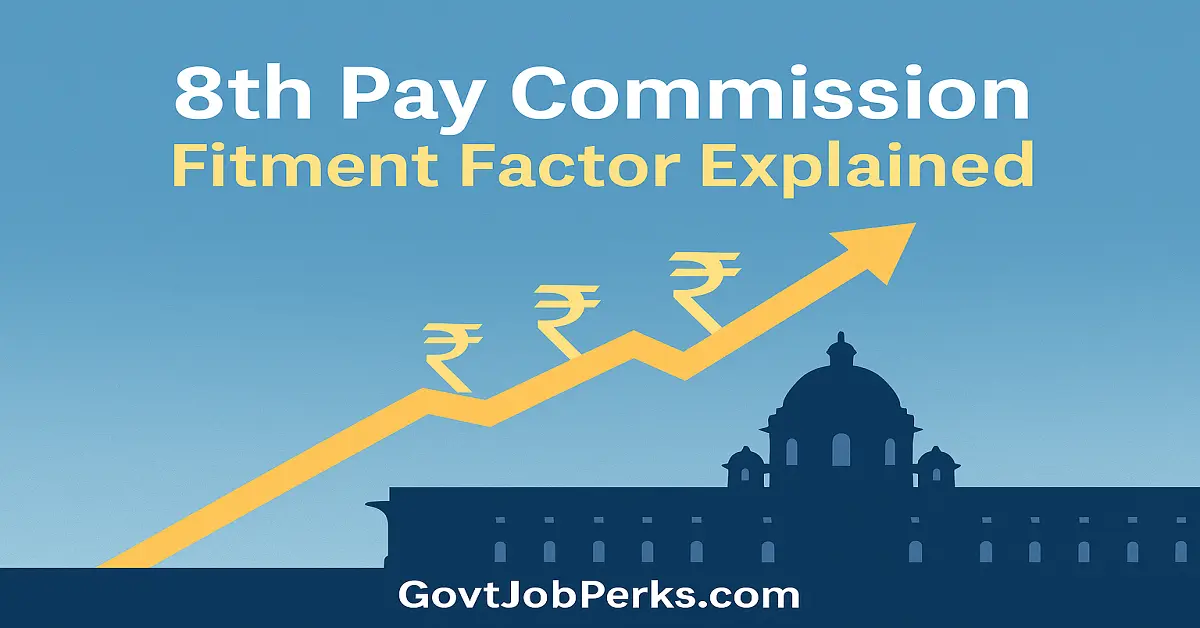🧮 8th Pay Commission Fitment Factor: What to Expect and How It Affects Your Salary
The 8th Central Pay Commission (CPC) is on every government employee’s radar — and rightly so! Among all its recommendations, one number decides the actual jump in your basic pay — the Fitment Factor.
But what exactly is this factor? How does it work? And more importantly, how much increase can central government employees expect this time?
Let’s break it all down in simple terms 👇
🔍 What is the Fitment Factor?
The fitment factor is a multiplier used to revise the basic pay of central government employees when a new Pay Commission is implemented.
Simply put:
New Basic Pay = Old Basic Pay × Fitment Factor
So, if your old basic pay was ₹20,000 and the fitment factor is 2.57, your new basic would become ₹51,400.
This single number directly impacts your Dearness Allowance (DA), HRA, and other allowances — meaning it doesn’t just raise your basic, it boosts your overall salary structure.
💰 7th Pay Commission Fitment Factor: The Baseline
When the 7th Pay Commission was implemented in 2016, the government fixed the fitment factor at 2.57.
That meant a minimum basic pay increase from ₹7,000 to ₹18,000 — roughly a 157% jump.
Every employee’s pay was multiplied by this factor, which led to an across-the-board hike in both salary and allowances. This 2.57 multiplier became the baseline for all future expectations.
📈 8th Pay Commission Fitment Factor: What’s Expected?
Now that the 8th CPC has been approved by the government and is in the preparatory stage, the big question is — what will the new fitment factor be?
Here’s what current discussions and analyses suggest:
🔹 Possible Fitment Factor Range: 1.8 to 2.86
- Some reports and think-tanks predict a fitment factor between 1.8 and 2.0, depending on fiscal conditions.
- Employee unions, however, are demanding at least 2.57 or even higher (up to 2.86) to match inflation and rising living costs.
If the factor is set at 2.46, as a few reports suggest, the minimum basic pay could jump from ₹18,000 to around ₹44,000 — a huge boost for lakhs of central government employees.
🧩 How Fitment Factor Impacts Your Salary
Let’s take a quick look at how salary growth could vary based on different fitment factors:
| Fitment Factor | Minimum Basic (₹) | % Increase Over 7th CPC |
|---|---|---|
| 1.8 | 32,400 | +80% |
| 2.46 | 44,280 | +146% |
| 2.57 | 46,260 | +157% |
| 2.86 | 51,480 | +186% |
The higher the fitment factor, the greater your revised salary. Even a 0.1 change in the multiplier can make a big difference in take-home pay and allowances.
🤝 What Employee Unions Are Demanding
The National Council (JCM) and other employee unions are strongly pushing for a minimum fitment factor of 2.57, arguing that:
- Inflation has significantly eroded real income since the 7th CPC.
- The gap between lower and higher pay levels should be reduced.
- A fair multiplier is needed to maintain purchasing power.
Some union leaders have even proposed 2.86 as an ideal factor — though experts call this “too ambitious.” Still, unions are unlikely to settle for anything below 2.57.
🧠 Experts’ and Economists’ Views
Financial experts have mixed opinions:
- Some believe a moderate factor around 1.8 to 2.0 is more realistic, balancing employee welfare with fiscal discipline.
- Others point out that a higher factor (above 2.4) could push up the government’s salary bill but would also stimulate consumer spending — indirectly boosting the economy.
Either way, the final number will likely be a balance between affordability and employee satisfaction.
🧮 Want to See How Much You’ll Earn Under 8th CPC?
Curious to know your expected salary under the 8th Pay Commission?
You don’t need to wait for the official report! Try our interactive tool below:
👉 8th Pay Commission Salary Calculator
Just enter your current basic pay and instantly see your projected salary, both in table and graph format — based on multiple fitment factor scenarios.
🔚 Final Thoughts
The fitment factor might look like just a small number, but it carries the biggest impact on every central government employee’s future salary.
While the government is expected to keep fiscal constraints in mind, employee unions are pushing hard for a higher multiplier — ideally 2.57 or above.
Whether it ends up being 1.92, 2.46, or 2.86, one thing is certain — the 8th Pay Commission will bring a major reshaping of the pay structure for millions of government employees across India.
Stay tuned to GovtJobPerks.com for all authentic updates, calculators, and news related to the 8th CPC.


Very useful to employees and pensioners
Very good notification. Thank you